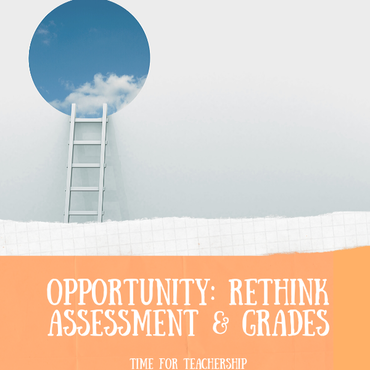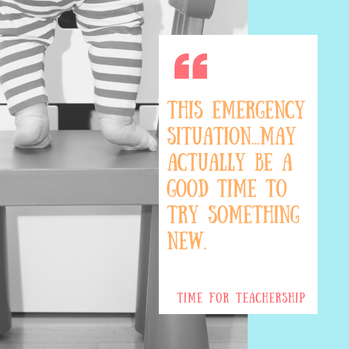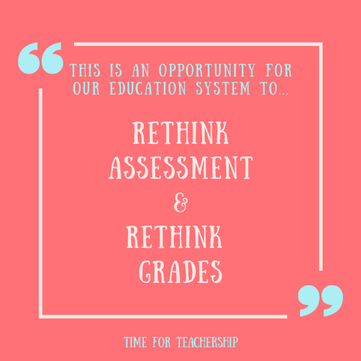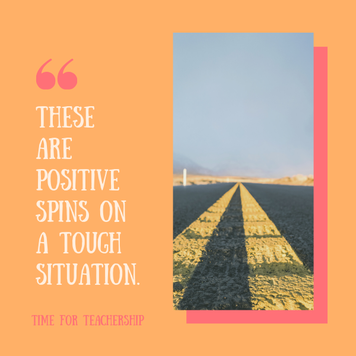|
This pandemic has asked a lot of educators. Transitioning to remote teaching at a moment’s notice is highly difficult and overwhelming. To be clear, no one is going to make an emergency transition like this perfectly. In fact, because this is new, teachers have been forced to teach in innovative, nontraditional ways. Some of these innovative pedagogical practices may have long-lasting positive effects on student learning. That’s right, I believe our education system has an opportunity for immense growth amidst all of the chaos. This post is the first in an “Opportunity” mini series where I’ll be discussing ways educators can test out ideas and strategies they might normally feel hesitant to try. But, given the “whatever works” attitude many of us have had to adopt in this emergency situation, this may actually be a good time to try something new. Opportunity #1: Rethink Assessment Teachers who typically assign multiple-choice quizzes or tests as their primary form of assessment may now be worried about students being able to cheat (i.e., look up the answer) while taking the quiz from home. One way around this is to create a task in which students cannot cheat. Try an open-ended question where there is no correct answer. Even better, create an application project in which students have to apply the information they learned to solve a problem or transfer the information to a novel situation. Another big mindset shift to consider is whether it’s actually bad practice for students to look up answers. Tests are assessments that really only exist in academic spaces. Sure, recall of factual information is helpful in life and in many careers, but many projects that adults are required to complete offer time and space to find answers to questions of which they are unsure. Just the process of looking up the information is helpful for students to learn, and by finding the correct answer, they have one more exposure to the content. One solution might be to tell students quizzes and tests are “open book” and tell them why—this is typically how life works. I need you to know this, so do what you need to do to find the answer. The other shift here is thinking about what we are asking of students when we ask them to answer multiple choice questions as a summative (or some formative) assessment. What do their correct answers tell us about their capabilities? At best, they tell us students can memorize information. Multiple choice test results do not tell us what they can do with that information. Can they apply it? Maybe. Maybe not. A professional in your discipline will need to apply that knowledge, not simply remember facts. Something you may consider doing when thinking about designing assessments is to ask: What does a professional in this field need to do? What will I know my students are able to do when they complete this assessment? Where would I find the skills they are demonstrating in this assessment on Bloom’s Taxonomy or Webb’s Depth of Knowledge chart? These ideas are valuable now that we are teaching remotely, but they are also incredibly valuable for the long-term as well. Application-based assessments and asking students to demonstrate higher-order thinking skills is a great curriculum design goal at any point in time. Opportunity #2: Rethink Grades Many schools and districts have prohibited grading students based on content or assignments shared in virtual classrooms. There’s a great reason for this. We cannot punish students who do not have access to the requisite technology to engage with online learning activities. However, a concern is that students who do have access to connected devices will not attend virtual classes or complete assignments if they are not being graded. Students have been trained their entire educational careers that they need to work hard to get a good grade. By the time they reach high school, this idea is deeply ingrained. The grade is what we hold over their head—the proverbial carrot (or stick). The problem with students only doing things for a grade is the lack of intrinsic motivation to learn. It’s interesting to think that grades may actually be inhibiting student learning. It deeply saddens me to hear students say they only care about the grade. I often wish I could get rid of grades all together to help students just focus on learning as much as possible because learning is valuable all on its own. That’s the opportunity we have right now! In many places, grades are off the table. Now, we just need to reignite that inner drive to learn for the sake of learning. (That’s a tall order, so the next several posts will address how we might do this.) In your school or district, you may still be required to give grades right now, and eventually we will all return to our routines and grading will be required. So, how does this apply in the long term? Reducing the number of grades helped me a lot. Sharing qualitative feedback in place of grades on formative assessments or classwork helped students develop more intrinsic motivation for daily assignments because the only official grade they received was on their final assessment. For teachers who work in schools that require a minimum number of grades, you will likely need to comply. Although, you may consider asking your administrator if feedback could be given in lieu of a formal grade. (Often administrators have a minimum grade requirement as an indicator that you, the student, and the student’s family can speak to the student’s academic progress. I know many administrators who are open to the idea of conveying that knowledge in ways other than grades.) Another option is if a grade is required in the short-term, ask if that can be overwritten by summative assessment grades when calculating the grade on each report card. These shifts may feel really big and overwhelming at this time of already high overwhelm, and if this is how it feels, don’t put more pressure on yourself. These posts in the opportunity series are not intended to be a list of things you need to add to your already overflowing to do list. These are merely positive spins on a tough situation that you can choose to try if you want. I’m excited to hear what comes from your innovative experiments in the areas of assessment and grades. Please share with the community in the comments section or on our Time for Teachership Facebook group!
0 Comments
Leave a Reply. |
Details
For transcripts of episodes (and the option to search for terms in transcripts), click here!
Time for Teachership is now a proud member of the...AuthorLindsay Lyons (she/her) is an educational justice coach who works with teachers and school leaders to inspire educational innovation for racial and gender justice, design curricula grounded in student voice, and build capacity for shared leadership. Lindsay taught in NYC public schools, holds a PhD in Leadership and Change, and is the founder of the educational blog and podcast, Time for Teachership. Archives
May 2024
Categories |





 RSS Feed
RSS Feed